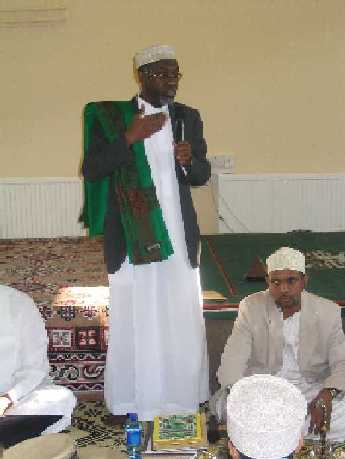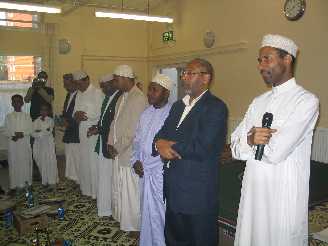
The Waswahili Community Trust UK
(Wadhamini wa jumuiya ya Waswahili)


|
The Waswahili Community Trust UK |

|
The Importance of practicing Islam in our daily life |

Before preceding any further I would like to make very important observation regarding the initiation and the meaning, and the significance use of Muslim greeting assallamu-a-alaikum.
The salam greeting is in fact a superior supplication, and a declaration or announcement meaning that you will be safe from any harm by my hand or tongue. To give salam greeting is voluntary but to answer is obligatory.
If someone is being greeted he/she has no choice but to respond by answering - wa-alaikumu salam.
Prophet Mohammad (PBUH) further guided that:
The Islamic greeting of salam is better than the other form of greetings of love, which are being used by both Muslims and non-Muslims. The reason being that it is not only an expression of love but also the reason and logic for this love is expressed in the form of supplication. By wishing the people being greeted to be saved from all forms of grief.
Most importantly when somebody says I pray that you be at peace, he/she is declaring and promising that you will be safe from his/her hand,tongue and he/she will respect your life, honour and dignity. Hence salam is a remembrance of Allah and thus an expression of love between Muslims.
This above all is what makes the salam greetings more superior and unique than any other form of greetings.
In Quran Allah says: Surah An Nisa # 86
Concluding on this point, it must be understood that the holy Quran is emphatic that one should answer salam greeting with the same or better words. My dear Muslim brothers, this therefore is the Islamic perspective of salam greetings. As said above, once salam is given there is no other option but to respond accordingly. It should also be understood that members of the congregation must also answer to the person who initiates salam greetings. Otherwise, we cannot claim to cherish Prophet Mohammad, if we fail to practice his teachings and guidance.
Today I have been given a heavy responsibility to give a brief presentation on the significance of Maulid. I will try as much as I can to discharge my responsibility to the best of my ability. In the meanwhile if there is any weakness or any flaw in my coverage of this very important topic, I accept full responsibility, and beg for your forgiveness.
The word Maulid is an Arabic word loaned into Swahili language. It simply means mazazi or a birthday. Therefore, in this specific sense, we can say that the main objective of this meeting today is to celebrate Prophet Mohammad's (PBUH) birthday.
This great jubilation, however, was symbolic the purpose of which was intended to greet and to welcome him with such kindness and such pleasure the coming of the Prophet Mohammad (PBUH) the Messenger of Allah, and the Seal of all the Prophets who was sent by Allah for the benefit of all humanity. Allah, the mercy and the merciful revealed this to the Prophet Mohammad:

If the birth of the Prophet Mohammad did not symbolise the great happiness and the great celebration for the Mankind then what other spiritual occasion or event that can be equated with such glory and happiness and celebration?
In the same way if Maulid celebration is being organised in such a way that the participants do not know each other, or not even greeting each other with such joy and happiness, in this sense, then the real purpose and the significance of Maulid is lost.
What is required therefore for the Maulid celebration is to bring together the community spirit and the unity of purpose within the association. This, however , will enable people to have the opportunity not only to meet casually, but also to get to know each other, and to exchange ideas, and helping one another. In creating this communal and the spiritual atmosphere then we can fulfil the basic condition of love and affection for the prophet Mohammad.(PBUH).
Therefore, it is of utmost importance to bear in mind that if we meet and organise Maulid celebration and indulging ourselves in such festivities. But at the same time, if our hearts and minds are not being guided and influenced by the Prophet's Mohammad (PBUH) spiritual teaching, then in such a situation, I am afraid to say that we are just troubling ourselves for nothing my dear fellow Muslim brothers.
There are three basic things in Islam we should try to avoid in every way possible. Firstly, when people meet and have a general conversation without taking such opportunity to understand each other on a personal level. Secondly, when a person is being invited for a meal and refuses such treatment, even though he/she is hungry.
Last, but not least, avoiding not to protect the position and dignity of our wives, and women in general from slander and insult. Allah, once said to the Prophet Mohammad (PBUH) tell them:
One cannot proclaim being a Muslim just by having a Muslim name. Also, a good and committed Muslim must not preach one thing and practice something else. One needs to practise what is being preached. Islam requires following faithfully Islamic values and the Prophet's guidance. As we know that the first acts of worship is to believe with the hearts and declare with the tongue:
Such declaration of faith also has its conditionality. It is not just a question of making a verbal declaration. Because, once one believe, there is only one God and Prophet Mohammad (PBUH) is his last Messenger, then the main condition after making such declaration is to practically obey them and to comply with the God's commandments.
Such conscious and practical expression of worshipping is the only way to show passionately our devotion and commitment to realise the significance of our celebration today and to obey its Islamic teachings in general. As the Messenger of Allah once said:
The first condition is to speak the truth, and nothing but the truth, and not to be afraid of any person irrespective of their social or economic status in society. Now let us examine our individual position and ask ourselves - : Do we always and under all circumstances speak nothing but the truth? In some cases if we do so, probably it is done to the weak members of our society, I mean people with low social status.
But, the potential ability in telling the truth to people of higher social status, is very much constraint, because of either fear or at best to avoid the trouble to do so, for one reason or another. Therefore, acting in this way, we cannot consider ourselves to be following God's Commandsments.
On this significant point, let's go back during the time of Prophet Mohammad's companions of scholars (Caliphs or Swahabas). As we know Caliph Sayyid-na-Ommar had a reputation of bravery, and courage both in the Pre-Islam period and during Islam. One day, he stood on a pulpit in a mosque and said to his audience:
Immediately, one of the prophet's companion in the mosque responded:
While Sayyid-na-Ommar still standing on a pulpit, he asked why you are refusing to listen and to obey. The same swahaba answered:
"We have received some pieces of cloths in the mosque for distribution to the members of the congregation, why you have gavin every person just one piece of cloth, and you reserved two pieces for yourself?" and the same swahaba added, "after showing this gross injustice, and yet you are standing up there and preaching for others to listen and obey, and what you have done is quite unfair, so how can we listen to you and obey you?"
Despite Sayyid-na-Ommar's tough reputation, he did not get irritated for having being told the truth. Equally, he did not use his power and authority to silence or to harm his critic. But, he remained calmed, and composed and rational and asked members of the congregation:
"Where is my son, Abdullah bin Omar, and suddenly he appeared from the congregation, Then Sayyid-na-Omar, said to his son, please answer that question as to why I have got in my possession two pieces of clothes, while all others have got only one piece. Abdullah bin Omar responded."
The answer given by Abdullah bin Omar, brought great satisfaction to all members of the congregation in the mosque, and one of them said:
"We are now satisfy with the explanation given, and that we are now going to listen and obey Sayyi-na-Ommar."
Another day Sayyid-na-Omar was sitting with the members of the prophet's companions. On this occasion he was sharing his knowledge and his experience with them. In the process of their meeting Sayyid-na-Omar, came with a hypothetical situation just to test the religious loyalty of the prophet's comapanion, and he said.
Supposing, one day, you find me to be deviating from the main religious stream and Quran's teaching and defaulting my religious obligation. So, putting myself in such a situation, what would be your response to my misguided behaviour? First, it must be understood that as said above Sayyid-na-Omar, commanded such a great authority and power and influence.
But, on the other hand to the swahabas, they did not fear him or be intimidated from giving him an honest and sincere answer to his question. They replied without any hesitation and said:
If we find you deviating from the main Islamic guidance and Islamic teaching, we will just get our swords and have your head beheaded. How did Sayyid-na-Ommar respond from hearing such answer to his question? Was he furious being a person who wielded such an enormous authority and influence to get such an answer to his question? Or did he use his authority to get the respondent arrested and get him locked away somewhere in prison just to intimidate others.
On this occasion also, he expressed great satisfaction, and raised his hands and said:
The second basic condition the Prophet demanded in order to guarantee Paradise is to act honestly and never to break promises. For example, when people agreed to meet at a certain place and on agreed time, then such promise must be acted upon accordingly.
The third condition in which the Prophet demanded in order to guarantee Paradise is composed of the following:
The fourth condition that Prophet demanded in order to guarantee Paradise is simply to close one's eyes and to keep away from steering on women or other peoples' wives. Or for that matter to observe anything which draws the attention of men to women.
The fifth condition that Prophet demanded in order to guarantee Paradise is not to stay unclothed in any form or manner. And to conceal one's private part and to refrain from being necked.
The sixth and final condition that Prophet demanded in order to guarantee Paradise is to restrain from committing any form of aggression or bullying other people. In other words, to extend the hand of friendship to your fellow human being, and not to cause any harm to any person.
God willing, (Inshalla) let's pray for God to guide us and to give us the ability and the commitment so that we can fulfil the six conditions as explained above.
Amin
We appeal for your donation for our charity
Comments and suggestions to improve this website
Your suggestions or concerns about our services
Please send you contributions.
| Thank you Asanteni |
|---|

Copyright© March 2003: The Waswahili Community Trust (UK)
Registered Charity:1083065